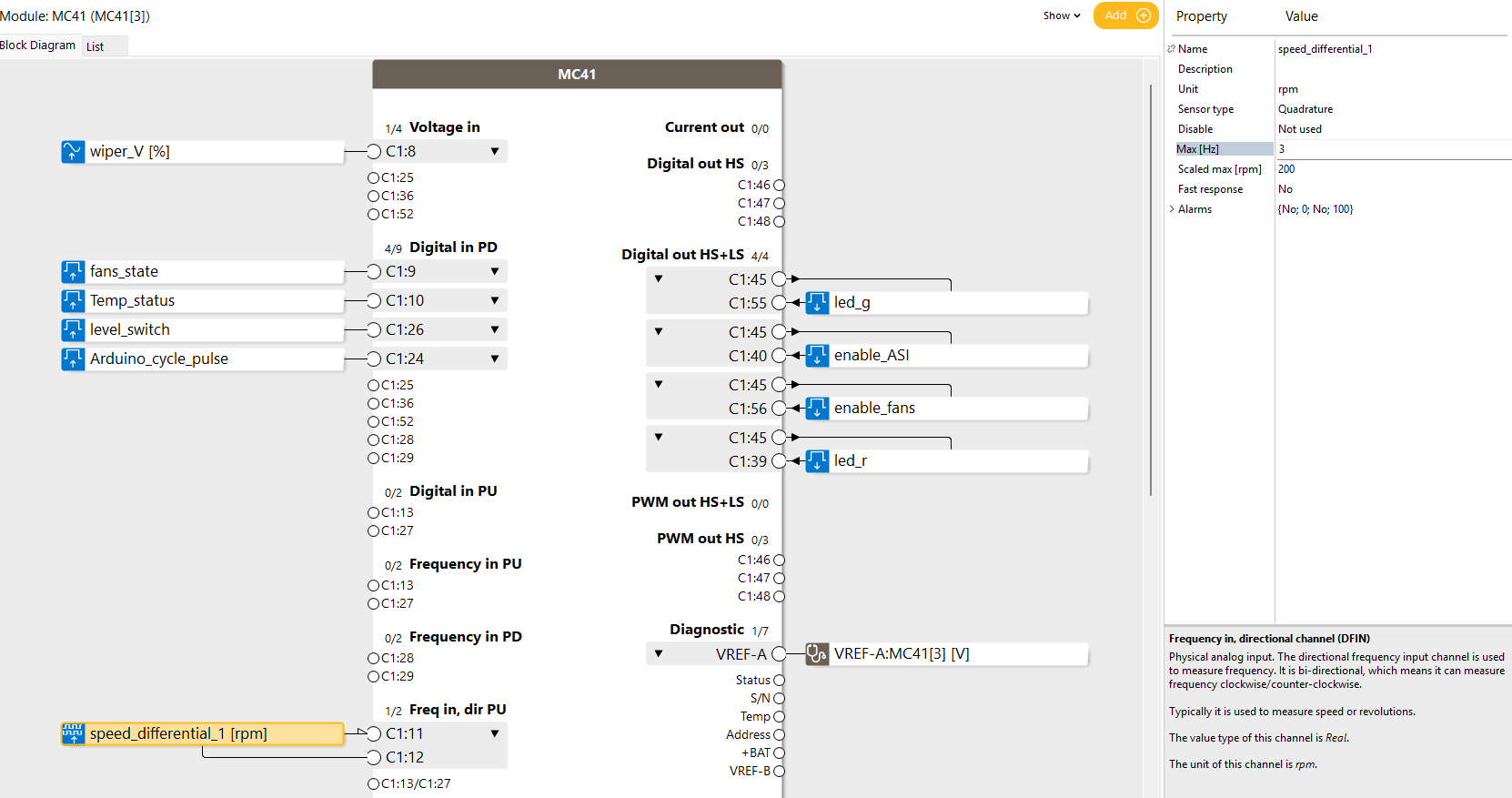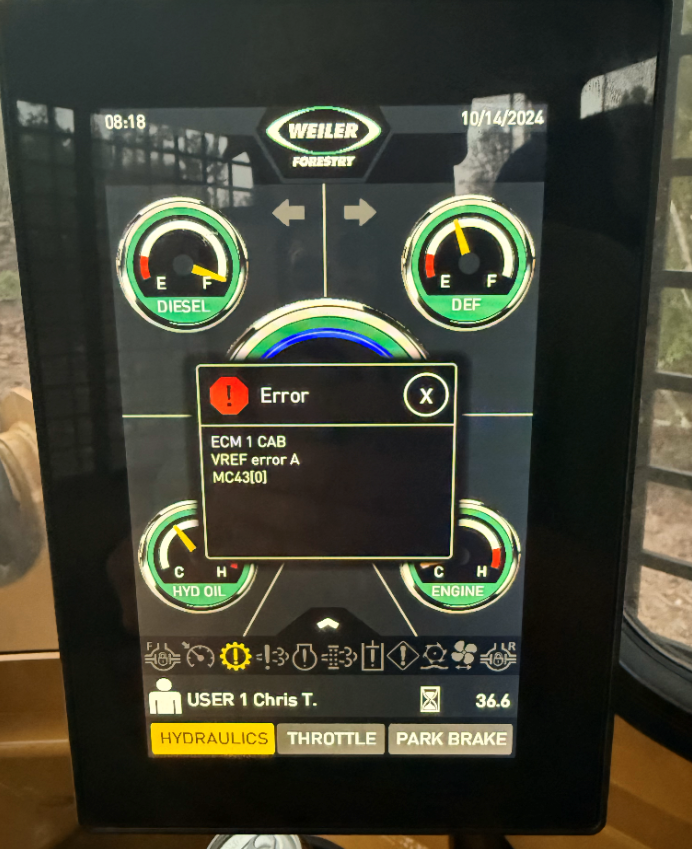
 MC4x/XC4x 12V 30W solenoid overload error
MC4x/XC4x 12V 30W solenoid overload error
What is the suggested solution for driving NG6 valves with standard 30W solenoids at 12V system voltage with MC4x/XC4x modules?
We use the HS+LS digital outputs for driving Parker D1VW valves with "K" code solenoids in a 12V system. As stated in the instrucion book, max load per output is 2.5A, but the measured current is 2.7A (as in the D1VW catalogue). The measured solenoid resistance is 5 Ohm, but it should be within 7-14 Ohm (MC4x/XC4x instrucion book).
30W solenoids are standard at other valve suppliers too, so changing the valve isn't an option. Change the system voltage to 24V also isn't possible for this project.

 MC41 - M18-4 Barrel Speed sensor
MC41 - M18-4 Barrel Speed sensor
Hi,
I have an MC41 module and I want to pick up the signal from a speed sensor M18-4VPFF200-Q8.
I want to measure the speed on the coupling between a motor and a torquemeter. I have a reflective sticker on the coupling, and I’m using this sensor to pick up the speed. However, when I connect the sensor, I’m reading zero on the MC41. I can see the lights on the sensor changing, which indicates the sensor is generating pulses, but the MC41 isn’t registering them.Here’s how I connected the sensor:
Sensor pin 1 (brown): 12V
Sensor pin 2 (white): GND
Sensor pin 3 (blue): C1:12 on the MC41
Sensor pin 4 (black): C1:11 on the MC41
The max speed I want to measure on the coupling is 200RPM. I calculated the max frequency as:
Thus I calculated my Max Frequency (Hz) = (Max RPM×Pulses per Revolution)/60 = (200*1)/60 = 3.33 ~ 3 Hz
Do you have any input on whether the issue might be software or hardware related?
Thanks!


 Master / Expansion Different -Batt
Master / Expansion Different -Batt
We have a requirement to have multiple XC43 modules remotely to the master MC43FS module. Its likely they will all be powered from separate power supplies and they wont supply the same 0V for batt -ve.
Is this likely to be a problem in terms of interference etc?

 PWM Output Commanded to 0, but voltage measured at Output
PWM Output Commanded to 0, but voltage measured at Output
IQAN Tech Support,
We are looking for help with troubleshooting our "IQAN Controller, Master Unit, IQAN - MC43" Safety Controller. It is getting inputs from two Temposonics tank-level sensors in our electronic water-level system, models GB Series & RF 5th Gen input sensors. The IQAN controller is PN 20085113.
We are receiving a potential difference (voltage output) of 0.39 V from Output pin to System Ground when measured with a multimeter; however the programming software indicates that the output should be 0 V. Our known inputs and outputs are below:
|
Inputs |
Outputs |
||||
|
I!: Inclinometer |
Connector 1, Pin 26 |
0 – 5 V |
O1: High |
Connector 1, Pin 48 |
0.24 V (Pin-to-Pin) |
|
I2: AFT Level Sensor |
Connector 1, Pin 53 |
4 - 20mA |
O2: Low |
System Ground |
|
|
I3: FWD Level Sensor |
Connector 2, Pin 33 |
4 - 20mA |
***SHOULD BE = 0.0 V Output*** |
||
- The tank level sensors are bottomed-out, as there is no water in the tank.
- With no water in the tank, the IQAN is programmed to output 0% Du Cycle, yielding 0.0 gallons on the display - but there is a .39V measured.
- The lowest water level reading that the sensors could output is 120 gallons, but should read 0.0 gallons below that.
- We are needing help troubleshooting and establishing / calibrating our 0.0 baseline
Questions:
1. Why is a voltage being read at the output, when the program is indicating that it should be zero?
2. Can we create a code or loop in the program to circumvent the small output voltage?

 Larger Program memory
Larger Program memory
For a long time we have been running into the limitation that the Program memory is too small for us. Is there also a view with the new MC4x to increase this in the future to 3Mb for example, this would help us enormously in adding functions that we are now forced to leave on the shelf.

 MC43 Reports Vref error cannot measure
MC43 Reports Vref error cannot measure
Good morning. I have and MC43 and MD4 running on a machine that is programmed in 6.08.32. I am getting random MC43 Vref B error codes along with the errors for the switches and transducers connected to that Vref.
When I record a plot graph of the MC43 diagnostic channel attached to the Vref, input voltage, and the input voltages for all the sensors, I am not able to record any change in the voltages that would indicate a Vref issue. Has anyone else ran into this issue?

 Lifetime of MC43FS
Lifetime of MC43FS
We have a project that is to be used for the next 40 years. It is a functional safety system that utilises MC43FS. These modules will likely be superseded multiple times (probably due to enhancements in electronics etc) after the 20 years lifetime shown in the manual:

To guarantee functional safety, presumably its recommended we remove and replace the MC43FS after 20 years as described in the manual regardless if the module is working correctly? I'm trying to avoid re-assessing the system in 20 years time and fitting a safety controller available in 2045. Therefore I intend on having a brand new MC43FS available for when the system needs a replacement module in 2045.
Is the 20 years triggered as soon as the module is powered up, therefore we would need to clone the software only when we want to replace the module in 2045 (rather than installing software now and starting the 20 years timer)? Or has the module 20 years been triggered from manufacturing date on the serial number?

 How to Perform Short to Ground and Short to Battery Tests on Parker ECU (like MC43FS)?
How to Perform Short to Ground and Short to Battery Tests on Parker ECU (like MC43FS)?
Hello,
I am working with a Parker ECU (MC43FS), and I need to test for short to ground and short to battery faults on specific pins. Could you please provide detailed instructions or best practices for performing these tests safely? Specifically, I am interested in:
- How to safely simulate a short to ground on the pin and verify the system's response.
- How to simulate a short to battery and what actions I should take to test the system's reaction.
- Any recommendations for multimeter settings or test equipment to use during these tests.
- Expected behaviors or diagnostic codes (e.g., LED blink codes or error logs) that the ECU will produce during these failure scenarios.
- Any precautions or potential risks I should be aware of during testing.
Thank you for your assistance!
Best regards,
Sayan Biswas

 Safety COUTs as DOUTs
Safety COUTs as DOUTs
We have a project that requires control of multiple cylinders, each cylinder is connected to a double acting valve, 2 separate coils, one for each cylinder movement (in/out). These outputs must be safety in our application.
Reading the instruction manual for the DOUTs on MC43FS, it states we must use only one DOUT HS and one DOUT LS per output when its being used in a safety application, so the controller can switch the valve off by either side in event of a fault. Therefore I have concluded we can only have 5 DOUT safety per MC43FS. Or in other words, 2.5 cylinder valve controls.
Can I instead use COUT, and therefore each cylinder function can be driven by a complete COUT A? For example, i can technically connect 10 cylinders, in/out, i.e. 20 valves? I would have to ensure the current does not exceed the limitations of the groups, but does having the shared COUT + affect the safety aspect of a COUT? There is a note saying all COUTs are safety, and nothing about sharing pins like there is under DOUT so I guess I can overcome my issue of limited DOUTs for safety?
I guess if there was a function other than driving a component in a direction it would not be possible, as you can only drive a COUT in either + or - direction, i.e. not both if you has different valves to energise, which could be at the same time.
Also it explicitly states no diodes on a coil connected to COUT (I guess for regulation), does this still apply if I'm using COUTs digitally, ramping from 0-100% and 100-0%? Would the collapsing digital coil cause damage to the COUT driver?

 What causes error code VREF error A on MC43?
What causes error code VREF error A on MC43?

Customer support service by UserEcho




